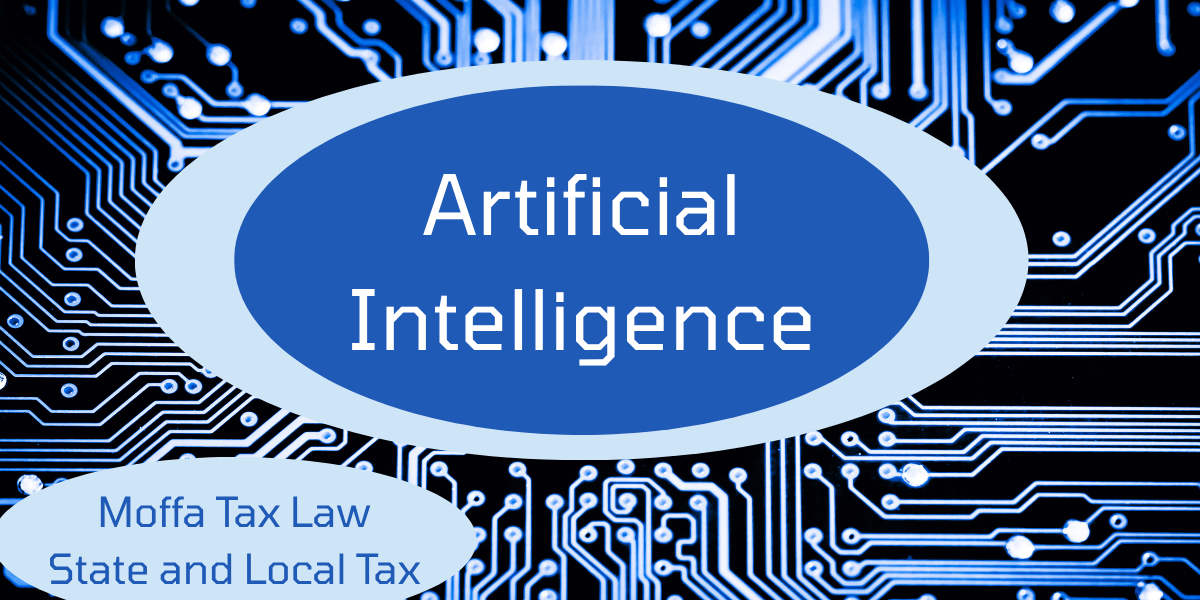NEWS & INSIGHTS


Is AI Subject to Sales Tax? Legal Risks, Enforcement Realities, and the Future of Automation in State Tax
Artificial intelligence (AI) has transitioned from emerging curiosity to commercial necessity. Businesses routinely use AI to analyze customer behavior, generate content, streamline operations, and—ironically—manage tax compliance. But as AI becomes ubiquitous, so does the uncertainty: Is AI subject to sales tax?
We are very much at the beginning of state and local taxation of artificial intelligence. This article explores both aspects of AI in the context of sales tax to the extent that we understand it currently: (1) when AI is the product being sold, and (2) when AI is the engine behind modern state tax enforcement systems. Understanding both aspects is critical for businesses, tax professionals, and policymakers navigating the evolving landscape of digital taxation.
Is AI a Taxable Product or Service?
Whether artificial intelligence is subject to sales tax depends on how it is delivered, what it does, and how it is legally characterized. The following are common delivery models and their associated tax implications:
- Installed AI Software: AI applications that are downloaded or installed locally are often treated as prewritten software, which is taxable in most states.
- SaaS-Based AI Platforms: Software as a Service (SaaS) AI products, accessed via the cloud, are taxed differently across states. Some states (like New York and Texas) impose sales tax on SaaS, while others (like Florida and California) generally exempt cloud-based software.
- AI as a Service (AIaaS): Tools that provide access to AI models or APIs, especially when billed on a subscription or usage basis, are often categorized under SaaS but may raise separate issues of classification.
- AI-Driven Information Services: AI platforms that generate reports or insights may fall under taxable information services in states where those are subject to sales tax.
- Professional or Customized Services: If the AI performs functions that would normally require a human expert—such as legal review, audit assistance, or personalized recommendations—the service may be treated as exempt in states that do not tax professional services.
Key taxability determinations often turn on the “true object” of the transaction. Are buyers purchasing access to software, or are they purchasing a result (like a legal analysis or data report)? State revenue departments scrutinize this distinction closely, especially when sales tax audits are involved.
State-Specific Guidance on AI Taxability
New York: The New York Department of Taxation and Finance has issued guidance stating that SaaS is taxable as prewritten software when accessed remotely, including platforms that incorporate artificial intelligence. If the AI is used primarily to deliver information, it may also fall under taxable information services.
Texas: The Texas Comptroller generally treats cloud-based software and data processing services as taxable. AI platforms delivered through SaaS or API models are likely subject to sales tax under Texas’s broad definitions of taxable software and data services.
California: The California Department of Tax and Fee Administration (CDTFA) generally does not tax SaaS or access to online platforms, including those powered by AI. However, if AI-generated output is bundled with tangible goods or downloaded software, it may be subject to tax.
Florida: The Florida Department of Revenue does not tax SaaS or most cloud-based services, including AI tools accessed via browser or API. However, services that deliver taxable data processing or communications services may trigger sales tax obligations.
Washington: Washington State taxes “digital automated services,” which may include many AI tools if delivered electronically. The Department of Revenue has noted that if an AI platform performs functions automatically without human intervention, it likely falls within taxable DAS.
Pennsylvania: The Pennsylvania Department of Revenue considers electronically accessed software, including SaaS, to be taxable. This includes AI-driven platforms that are remotely accessed and used for data analysis or decision-making.
Economic Nexus and Multi-State Risk for AI Providers
Since the U.S. Supreme Court’s decision in South Dakota v. Wayfair, Inc., states may require remote sellers to collect and remit sales tax even if they lack a physical presence. AI developers, particularly those offering SaaS or AIaaS products nationwide, face exposure in any state where they exceed sales or transaction thresholds.
Because AI tools are often sold via subscription or metered API access, even small vendors can quickly meet economic nexus thresholds in high-population states. Businesses that fail to register and collect sales tax may be subject to audit, penalty, and interest.
From Product to Enforcer: AI Inside the Tax Department
Artificial intelligence is not only subject to taxation—it is also being deployed as a tool by the tax authorities themselves. State departments of revenue are increasingly using AI to enforce compliance, identify suspicious behavior, and trigger audits.
One major example is a state-level system that uses AI to analyze taxpayer data and detect anomalies, such as refund claims that appear fraudulent. These systems, often designed as predictive analytics engines, operate with minimal human oversight and rely on proprietary algorithms that are not disclosed to the public.
This marks a turning point: AI is no longer just a taxable item—it is a tax administrator.
AI Enforcement and Due Process Risks
- Algorithmic Opacity: AI models used by state revenue departments often operate as “black boxes,” providing no meaningful explanation of how decisions are made.
- Reversal of Burden: Taxpayers may be denied refunds or flagged for audit based solely on algorithmic suspicion—without a clear reason or opportunity to challenge the result.
- Lack of Rulemaking: Many of these systems are implemented without formal administrative rulemaking or public comment, sidestepping transparency obligations.
- Privacy Concerns: AI systems may rely on sensitive personal or third-party data (e.g., credit card records) without publicly disclosed safeguards or oversight.
This new enforcement model flips due process on its head. Rather than the government justifying an audit, the taxpayer is forced to refute a machine’s suspicion—often without access to the data or reasoning behind it.
Legal Frameworks and Accountability
Some jurisdictions have begun to address the growing use of AI in state functions through legislation. Emerging regulatory frameworks require agencies to disclose when automated decision-making systems are used and mandate safeguards such as human oversight, documentation, and data governance.
However, these laws are often vague, limited in scope, or not yet fully implemented. In many cases, AI enforcement systems are already operational before public accountability mechanisms are in place. This regulatory lag creates serious risks:
- Audit decisions made by undisclosed algorithms
- Tax assessments influenced by machine learning systems that cannot be cross-examined
- Opaque audit selection criteria immune to legal challenge due to trade secret protections
What Taxpayers and Businesses Should Do Now
- Conduct a Sales Tax Review: Determine how your AI product is classified in each jurisdiction. Consider obtaining a private letter ruling or advisory opinion if needed.
- Monitor Nexus Exposure: Track where your customer base creates collection obligations and register promptly when thresholds are exceeded.
- Request Transparency: If you are subject to a sales tax audit triggered by an AI system, ask the state to disclose how the case was selected and what data was used.
- Engage Legal Counsel: Consider legal challenges if you are subject to enforcement based solely on undisclosed automated systems.
- Advocate for Reform: Support legislation requiring disclosure, explainability, and oversight of AI systems used by government agencies.
The Future of AI in Taxation
AI will undoubtedly remain a powerful force in the future of tax administration. But the challenge lies not in the technology itself, but in its unchecked use. If AI continues to be deployed without transparency, accountability, or procedural safeguards, then taxpayers will find themselves in an increasingly adversarial and unpredictable enforcement environment.
The irony is that while businesses may worry about whether they must collect sales tax on AI, the more pressing reality may be that AI is already collecting data on them.
Final Thought
- Is AI subject to sales tax when sold or licensed?
- Can AI systems lawfully and fairly enforce sales tax compliance on behalf of the state?
Until governments adopt clear rules, businesses must treat both questions with equal urgency. As we enter an age of algorithmic enforcement, the tax landscape will be shaped not just by rates and rules, but by the invisible logic of machines.
For AI providers, sales tax professionals, and taxpayers alike, the message is clear: the future is here, and it’s watching you.
© 2025 Jeanette Moffa. All Rights Reserved.
Yes, AI may be subject to sales tax depending on how it is delivered and classified. Installed software and SaaS-based AI platforms may be taxable in many states, while AI delivered as part of professional services may be exempt in others.
In many states, Software as a Service (SaaS) is taxable, and this includes AI platforms accessed via the cloud or API. States like New York, Texas, and Pennsylvania tax SaaS, while others like Florida and California generally do not.
Florida does not currently impose sales tax on SaaS or cloud-based AI services accessed via browser or API. However, if the AI platform involves taxable data processing or communication services, it may trigger Florida sales tax liability.
States often apply the “true object” test to determine taxability. If the primary goal is to access software, the transaction may be taxable. If the buyer is purchasing a service outcome—like analytics or legal advice—the service may be exempt.
If AI generates reports that fall under a state’s definition of “information services,” they may be taxable. This depends on whether the output is customized, professional in nature, or delivered via software.
Yes, AI may be treated differently based on whether it functions independently, delivers custom services, or is embedded within other taxable software. States also vary in how they classify AI-powered platforms under digital goods or services.
AIaaS refers to platforms that provide access to AI models, APIs, or functions on a usage or subscription basis. These are often taxable as SaaS in states that tax digital software access.
Yes. Selling AI services or platforms across state lines—especially through subscriptions—can create economic nexus. Businesses may be required to register, collect, and remit sales tax in states where they exceed economic thresholds.
Yes. Many state departments of revenue use AI to detect audit triggers, prevent refund fraud, and automate enforcement. These systems pose new legal questions about transparency, due process, and accountability.
Businesses should conduct a multi-state sales tax review, seek advisory rulings where possible, and monitor evolving legislation around AI classification. Legal counsel is recommended for companies facing AI-related tax audits or nexus concerns.
Share
Additional Articles by the SALTy Orange at Moffa Tax Law:
Florida Repeals Sales Tax on Commercial Rent — Will DeSantis Sign the Landmark 2025 Tax Cut?
NEWS & INSIGHTS Florida Repeals Sales Tax on Commercial Rent — Will DeSantis Sign the Landmark 2025 Tax Cut? …
NEWS & INSIGHTS Is Bottled Coffee Subject to Florida Sales Tax? The Answer May Surprise You Is Bottled Coffee Subject…
Inside the ABA SALT Committee Meeting: What Tax Professionals Need to Know About the Annual May Conference in D.C.
NEWS & INSIGHTS Inside the ABA SALT Committee Meeting: What Tax Professionals Need to Know About the Annual May Conference…

Jeanette Moffa, Esq.
(954) 800-4138
JeanetteMoffa@MoffaTaxLaw.com
Jeanette Moffa is a Partner in the Fort Lauderdale office of Moffa, Sutton, & Donnini. She focuses her practice in Florida state and local tax. Jeanette provides SALT planning and consulting as part of her practice, addressing issues such as nexus and taxability, including exemptions, inclusions, and exclusions of transactions from the tax base. In addition, she handles tax controversy, working with state and local agencies in resolution of assessment and refund cases. She also litigates state and local tax and administrative law issues.


